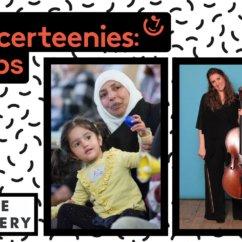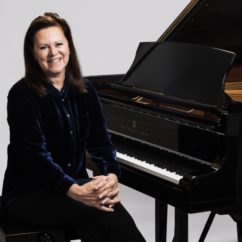An Evening with British Composers
Choral treats from Gustav and Imogen Holst, Benjamin Britten and Grace Williams
The Chorus is pleased to present a programme of contrasting works by male and female English and Welsh composers in the newly-refurbished Victoria Hall. Accompanied by the National Festival Orchestra led by Sally Robinson and organist James Mitchell, and conducted by Music Director Darius Battiwalla, this is your chance to hear the City Hall's Resident Chorus 'up close and personal'.
Benjamin Britten's highly acclaimed and unique cantata Rejoice in the Lamb was composed in 1943 to text taken from Christopher Smart's bizarre 18th century poem Jubilate Agno, first published in 1939. Smart was famous for approaching people in the street and asking them to pray with him, which in those days was reason enough to confine him to a madhouse. His poem grabbed Britten’s imagination and he was able to reveal Smart as more visionary than lunatic, and his poem as a wonderfully imaginative Benedicite or thanksgiving. It may not be orthodox or biblical to see the creative wonder of God in tigers, bears, bassoons, clarinets, and letters of the alphabet but, Britten smilingly asks, why not?
Imogen Holst was Benjamin Britten's musical assistant and artistic director of the annual Aldeburgh Festival for many years, eventually giving this up to resume composing and preserving her father's musical legacy. Imogen showed precocious talent in composing and performance from a young age, and wrote her Three Psalms in 1933. The pieces are expressive and generous, using dissonance and drama alongside restrained accompaniment so the spotlight is firmly on the singers and the words of the psalms.
Imogen's father Gustav Holst’s Two Psalms was written 21 years earlier, again for chorus, organ and strings. Holst found the spiritual aspect of the church very appealing, but disliked what he saw as its regimented orthodoxy and, probably as a result, composed little sacred music. The Two Psalms, written before The Planets and as different from that work as can be imagined, use plainchant and chorale harmonization to great effect, conveying reverence and anguish in equal measure. Holst served as the music master at St Paul’s Girls’ School in Hammersmith from 1905 to 1934 and the National Festival Orchestra will play his short but perfectly-formed St Paul’s Suite, one of many pieces he wrote for the school’s students.
Welsh composer Grace Williams was a contemporary of both Britten and Imogen Holst and one of the first professional Welsh composers of the twentieth-century to attain significant national recognition. Many of her works are directly inspired by Wales and its culture. She worked as a successful composer and music teacher in London for many years, but returned to live and work in Wales in 1947, writing choral and vocal music in her later years. Her exquisite Ave Maris Stella for mixed chorus was commissioned by the North Wales Music Festival in 1973, and the rhythms and melodic lines of the music reflect the ebb and flow of the sea, with which the composer had a life-long fascination. Read more about Grace Williams, regarded by some as one of the greatest female composers of the 20th century, on her official website: Grace Williams website.
Tickets £18 online (small booking fee) and on the door, £5 for students on the door, under 18s and carers free on the door. Wheelchair tickets available , please email administrator@sheffieldphil.org.
Performers
Sheffield Philharmonic Chorus, Darius Battiwalla (Conductor), National Festival Orchestra (orchestra) and James Mitchell (organ)
Programme
- Benjamin Britten: Rejoice in the Lamb
- Imogen Holst: Three Psalms
- Grace Williams: Ave Maris Stella
- Gustav Holst: St Paul's Suite
- Gustav Holst: Two Psalms





